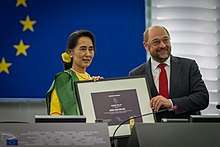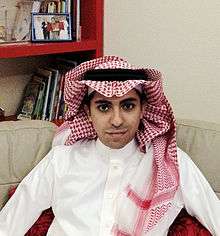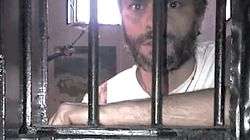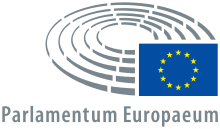Sakharov Prize
The Sakharov Prize for Freedom of Thought, commonly known as the Sakharov Prize, honours individuals and groups of people who have dedicated their lives to the defense of human rights and freedom of thought.[2] Named after Russian scientist and dissident Andrei Sakharov, the prize was established in December 1988 by the European Parliament.[2] A shortlist of nominees is drawn up annually by the European Parliament's Committee on Foreign Affairs and Committee on Development. The MEPs who make up those committees then select a shortlist in September.[3] Thereafter, the final choice is given to The European Parliament’s Conference of Presidents (President and political group’s leaders) and the laureate's name is announced late in October. The prize is awarded in a ceremony at the Parliament’s Strasbourg hemicycle (round chamber) in December.[1][3] The prize includes a monetary award of €50,000.[1]
| Sakharov Prize for Freedom of Thought | |
|---|---|
 The awarding ceremony of the 1990 prize awarded to Aung San Suu Kyi inside the Parliament's Strasbourg hemicycle, in 2013 | |
| Presented by | European Parliament |
| Reward(s) | €50,000[1] |
| First awarded | December 1988 |
| Currently held by | Ilham Tohti |
| Website | Official website |
The first prize was awarded jointly to South African Nelson Mandela and Russian Anatoly Marchenko. The 1990 award was given to Aung San Suu Kyi, but she could not receive it until 2013 as a result of her political imprisonment in Burma.[4] The prize has also been awarded to organisations, the first being the Argentine Mothers of the Plaza de Mayo in 1992. Five Sakharov laureates were subsequently awarded the Nobel Peace Prize: Nelson Mandela, Aung San Suu Kyi, Malala Yousafzai, Denis Mukwege, and Nadia Murad.[5]
Razan Zaitouneh (2011) was kidnapped in 2013 and is still missing.[6] Nasrin Sotoudeh (2012) was released from prison in September 2013,[7] but is still barred from leaving Iran, along with fellow 2012 laureate Jafar Panahi.[8] The 2017 prize was awarded to the Democratic Opposition in Venezuela, under boycott of the European United Left–Nordic Green Left.[9][10]
Laureates
.jpg)

.jpg)




| Year | Recipient | Nationality | Notes | Reference |
|---|---|---|---|---|
| 1988 | Nelson Mandela | Anti-apartheid activist and later President of South Africa | [11] | |
| Anatoly Marchenko (posthumously) | Soviet dissident, author and human rights activist | [11] | ||
| 1989 | Alexander Dubček | Slovak politician, attempted to reform the communist regime during the Prague Spring | [11] | |
| 1990 | Aung San Suu Kyi | Opposition politician and a former General Secretary of the National League for Democracy | [12] | |
| 1991 | Adem Demaçi | Kosovo Albanian Politician and long-term political prisoner | [11] | |
| 1992 | Mothers of the Plaza de Mayo | Association of Argentine mothers whose children disappeared during the Dirty War | [12] | |
| 1993 | Oslobođenje | Popular newspaper that defended Bosnia and Herzegovina as a multi-ethnic state | [12] | |
| 1994 | Taslima Nasrin | Ex-doctor, feminist author | [12] | |
| 1995 | Leyla Zana | Politician of Kurdish descent from Southeastern Turkey, who was imprisoned for 15 years for being member of PKK. | [11] | |
| 1996 | Wei Jingsheng | An activist in the Chinese democracy movement | [12] | |
| 1997 | Salima Ghezali | Journalist and writer, an activist of women's rights, human rights and democracy in Algeria | [12] | |
| 1998 | Ibrahim Rugova | Kosovo Albanian politician, the first President of Kosovo | [11] | |
| 1999 | Xanana Gusmão | Former militant who was the first President of East Timor | [13] | |
| 2000 | ¡Basta Ya! | Organisation uniting individuals of various political positions against terrorism | [14] | |
| 2001 | Nurit Peled-Elhanan | Peace activist | [11] | |
| Izzat Ghazzawi | Writer, professor | |||
| Dom Zacarias Kamwenho | Archbishop and peace activist | |||
| 2002 | Oswaldo Payá | Political activist and dissident | [15] | |
| 2003 | Kofi Annan | Nobel Peace Prize recipient and seventh Secretary-General of the United Nations | [11] | |
| United Nations | N/A (International) | |||
| 2004 | Belarusian Association of Journalists | Non-governmental organisation "aiming to ensure freedom of speech and rights of receiving and distributing information and promoting professional standards of journalism" | [16] | |
| 2005 | Ladies in White | Opposition movement, relatives of jailed dissidents | [17] | |
| Reporters Without Borders | N/A (International) | France-based non-governmental organisation advocating freedom of the press | [17] | |
| Hauwa Ibrahim | Human rights lawyer | [17] | ||
| 2006 | Alaksandar Milinkievič | Politician chosen by United Democratic Forces of Belarus as the joint candidate of the opposition in the presidential elections of 2006 | [18] | |
| 2007 | Salih Mahmoud Osman | Human rights lawyer | [12] | |
| 2008 | Hu Jia | Activist and dissident | [19] | |
| 2009 | Memorial | International civil rights and historical society | [20] | |
| 2010 | Guillermo Fariñas | Doctor, journalist and political dissident | [21] | |
| 2011 | Asmaa Mahfouz | Five representatives of the Arab people, in recognition and support of their drive for freedom and human rights. | [22] | |
| Ahmed al-Senussi | ||||
| Razan Zaitouneh | ||||
| Ali Farzat | ||||
| Mohamed Bouazizi (posthumously) | ||||
| 2012 | Jafar Panahi | Iranian activists, Sotoudeh is a lawyer and Panahi is a film director. | [23][24] | |
| Nasrin Sotoudeh | ||||
| 2013 | Malala Yousafzai | Campaigner for women's rights and education | [25] | |
| 2014 | Denis Mukwege | Gynecologist treating victims of gang rape | [26] | |
| 2015 | Raif Badawi | Saudi Arabian writer and activist and the creator of the website Free Saudi Liberals | [27] | |
| 2016 | Nadia Murad Basee | Yazidi human rights activists and former abductees of the Islamic State of Iraq and the Levant | [28] | |
| Lamiya Aji Bashar | ||||
| 2017 | Democratic Opposition in Venezuela | Members of the country's National Assembly and all political prisoners as listed by Foro Penal Venezolano represented by Leopoldo López, Julio Borges, Antonio Ledezma, Daniel Ceballos, Yon Goicoechea, Lorent Saleh, Alfredo Ramos and Andrea González. The award was seen as rewarding the "courage of student activists and protesters in face of repression by Nicolas Maduro's government".[29] | [30] | |
| 2018 | Oleg Sentsov | Film director, symbol of the struggle for the release of political prisoners held in Russia and around the world | [31] | |
| 2019 | Ilham Tohti | Uyghur economist, scholar and human rights activist | [32] |
References
- "Sakharov Prize". European Parliament. Archived from the original on 15 September 2017. Retrieved 29 October 2017.
- "1986: Sakharov comes in from the cold". BBC News. 23 December 1986. Archived from the original on 26 December 2010. Retrieved 21 October 2010.
- "Sakharov Prize 2018: three finalists selected", News—European Parliament, 10 September 2018.
- Cook, Annabel (22 October 2013). "Aung San Suu Kyi collects Sakharov prize 23 years on". Financial Times. Archived from the original on 28 October 2017. Retrieved 27 October 2017.
- Boshnaq, Mona; Chan, Sewell; Dremeaux, Lillie; Karasz, Palko; Kruhly, Madeleine. "Nobel Peace Prize Winners Throughout History". The New York Times. Archived from the original on 13 October 2017.
- "Razan Zaitouneh". European Parliament. Archived from the original on 28 October 2017. Retrieved 27 October 2017.
- "Nasrin Sotoudeh". European Parliament. Archived from the original on 28 October 2017. Retrieved 27 October 2017.
- "Jafar Panahi". Archived from the original on 28 October 2017. Retrieved 27 October 2017.
- Schreuer, Milan (26 October 2017). "Venezuelan Opposition Receives E.U.'s Sakharov Freedom Prize". The New York Times. ISSN 0362-4331. Archived from the original on 26 October 2017. Retrieved 31 October 2017.
- "Left to boycott politicised Sakharov Prize ceremony - GUE/NGL - Another Europe is possible". www.guengl.eu. Archived from the original on 1 February 2018. Retrieved 31 January 2018.
- "20 years of the Sakharov Prize: Human rights and reconciliation". European Parliament. 28 October 2008. Archived from the original on 12 December 2010. Retrieved 22 October 2010.
- "Sakharov Network calls for immediate release of Aung San Suu Kyi, Sakharov Prize laureate 1990". Reporters Without Borders. 15 May 2009. Archived from the original on 16 October 2012. Retrieved 23 October 2010.
- "Gusmão receives EU Sakharov prize". BBC News. 15 December 1999. Retrieved 21 October 2010.
- "Basque group wins peace prize". BBC News. 26 October 2000. Archived from the original on 1 April 2007. Retrieved 21 October 2010.
- "Cuban dissident collects EU prize". BBC News. 17 December 2002. Archived from the original on 7 May 2004. Retrieved 21 October 2010.
- "The Belarusian Association of Journalists - 2004, Belarus". European Parliament. 9 November 2004. Archived from the original on 18 February 2015. Retrieved 18 February 2015.
- Gibbs, Stephen (14 December 2005). "Cuba 'bars women from prize trip'". BBC News. Archived from the original on 17 November 2006. Retrieved 21 October 2010.
- "Belarussian takes EU rights award". BBC News. 26 October 2006. Retrieved 21 October 2010.
- "China dissident wins rights prize". BBC News. 17 December 2008. Archived from the original on 30 December 2008. Retrieved 21 October 2010.
- "Russia rights group wins EU prize". BBC News. 22 October 2009. Retrieved 21 October 2010.
- "Cuba dissident Farinas awarded Sakharov Prize by EU". BBC News. 21 October 2010. Archived from the original on 22 October 2010. Retrieved 21 October 2010.
- "Sakharov Prize for Freedom of Thought 2011". European Parliament. Archived from the original on 23 October 2011. Retrieved 27 October 2011.
- Dehghan, Saeed Kamali (26 October 2012). "Nasrin Sotoudeh and director Jafar Panahi share top human rights prize". The Guardian. Archived from the original on 26 October 2012. Retrieved 26 October 2012.
- "Nasrin Sotoudeh and Jafar Panahi – winners of the 2012 Sakharov Prize" (PDF). European Parliament. Archived (PDF) from the original on 22 December 2015. Retrieved 27 October 2012.
- Jordan, Carol (10 October 2013). "Malala wins Sakharov Prize for freedom of thought". CNN. Archived from the original on 15 October 2013. Retrieved 10 October 2013.
- "DR Congo doctor Denis Mukwege wins Sakharov prize". BBC News. 21 October 2014. Archived from the original on 22 October 2014. Retrieved 22 October 2014.
- "Raif Badawi wins Sakharov human rights prize". The Guardian. Brussels. Associated Press in. Archived from the original on 29 October 2015. Retrieved 29 October 2015.
- "Sakharov prize: Yazidi women win EU freedom prize". BBC News. 27 October 2016. Archived from the original on 27 October 2016. Retrieved 27 October 2016.
- "Venezuela's opposition awarded Sakharov Prize for championing human rights". The Independent. 26 October 2017. Archived from the original on 28 October 2017. Retrieved 28 October 2017.
- "Parliament awards Sakharov Prize 2017 to Democratic Opposition in Venezuela". European Parliament. 26 October 2017. Archived from the original on 28 October 2017. Retrieved 27 October 2017.
- "Sakharov Prize 2018 goes to Oleg Sentsov". European Parliament. Retrieved 25 October 2018.
- "Ilham Tohti awarded the 2019 Sakharov Prize". European Parliament. 24 October 2019. Retrieved 24 October 2019.
External links
- "Sakharov Prize for Freedom of Thought". European Parliament. 1 December 2013. Retrieved 21 October 2016.
- "Sakharov Prize Network". European Parliament. 1 December 2013. Retrieved 21 October 2016.
- "20 years of the Sakharov Prize: rewarding courage, self-sacrifice". European Parliament. 1 December 2008. Retrieved 22 October 2010.
Notes
| a. | ^ Kosovo is the subject of a territorial dispute between the Republic of Kosovo and the Republic of Serbia. The Republic of Kosovo unilaterally declared independence on 17 February 2008, but Serbia continues to claim it as part of its own sovereign territory. The two governments began to normalise relations in 2013, as part of the 2013 Brussels Agreement. Kosovo is currently recognized as an independent state by 97 out of the 193 United Nations member states. In total, 112 UN member states recognized Kosovo at some point, of which 15 later withdrew their recognition. |

